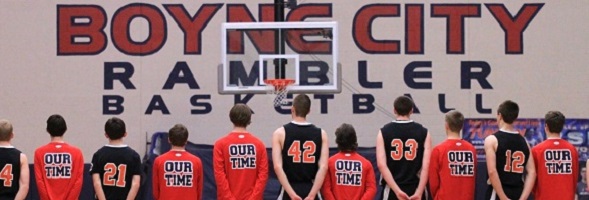
Graduation of Multi-Sport Athletes
December 8, 2014
By David Smith
Boyne City athletic director
Editor’s Note: This is reprinted with permission from the Petoskey News-Review, which is publishing semi-regular columns written by athletic directors for the northwest region of the Lower Peninsula. Click for more sports coverage from the News-Review.
There are many important topics today that relate to high school sports. I was honored when asked to write a brief column about a current topic of my choice in the high sports world. This particular topic, student-athletes specializing in one sport, is something that is happening more and more.
It’s hard to pinpoint exactly why this is, but it often times seems to boil down to unrealistic expectations from several parties that an athlete is capable of being a legitimate college or higher-level athlete.
Don’t get me wrong, we have a plethora of outstanding athletes in Northern Michigan. The facts are, however, that about 98 out of 100 high school athletes never play collegiate sports of any kind at any level. Also, less than one percent of high school athletes receive a scholarship of any kind to a Division I school.
I don’t want to tell someone not to have that dream. In fact, I think that is an awesome dream to have. I had that goal growing up and was fortunate to be able to play a few different sports at a small Division III college. It helped me grow immensely as a person, and I’m very thankful for that experience. I just can’t emphasize enough how we need to all have realistic expectations for our student athletes, whether it’s the athletes themselves, or parents, coaches, administrators, etc.
I think one thing we can all do to help this is to emphasize the process more than the outcome. The funny thing is getting the process right and enjoying it almost always leads to positive outcomes. The process is where all the hard work is put in. The process is where good character is developed, and that’s one of the most important traits we can help young individuals develop.
Many high school athletes are also too busy and compete too much. The amount of young athletes competing year-round for sports is getting out of control. Sure, sometimes it works out and an athlete will really improve by doing this, but more often than not, they get burned out and when it’s actually that sport in-season, they are toast and go through the motions. I know from a coaching standpoint I want athletes hungry to compete every time out.
Being that busy also means very little time for athletes to improve their overall athleticism (stronger, faster, quicker, more explosive, better endurance, etc.). Skills take a back seat too because most athletes are just playing games and not focusing on skill work. I’d rather take an athlete who trains to become more athletic and works on skills for several months than one who plays AAU or something of that nature. I know that has its place for a very few individuals, but most young athletes need way more work on their athleticism and skills before being ready for something like AAU.
I get specializing in one sport if you are undoubtedly a Division I athlete that will likely play professionally. Or maybe it’s someone who goes to a big high school and they aren’t very talented so the only way they can play is to focus really hard on one sport. I get those occurrences.
I would argue, however, that even the Division I-type individuals will nine times out of 10 benefit more from playing another sport because they aren’t going to work hard enough by themselves to make the gains. They would then also be refreshed and ready to get after it once the season arrives. With that, our schools up here will always have a hard time competing at the regional and state level if we don’t have all of our best athletes playing two or three sports. It blows me away how good some of our teams in the area could fare if this happened.
This column is not meant to be negative. It’s just some food for thought. I haven’t been at this very long, but it’s something I’ve seen happen more and more in the last 10 years. I’ve just always been a big fan of the multiple sport athlete and experienced first-hand how much a school can benefit when a group of talented athletes go through and they all play a minimum of two sports.
At the end of the day, we cannot forget what I’d consider the main purpose of athletics at this level. That is, to help young individuals leave our schools with experiences and life lessons that will help them as they pursue careers and go on with other facets of their lives.

Specialization Not the Only Pathway
April 21, 2015
 By Eric Martin
By Eric Martin
MSU Institute for the Study of Youth Sports
Specialization is not a new topic facing athletes and parents.
In a 1989 study by Hill and Simons, athletic directors indicated that the three-sport athletes of the past were being replaced by athletes who only participated in a single sport. Multiple athletic directors indicated that the decrease of multi-sport participation was a concern for all involved in the sport environment as increased emphasis on sport specialization was not in the true vision of high school sports.
Even though the distress concerning sport specialization is not a new topic, the rise of club sports and year-round travel teams have increased the number of youth athletes who are forced to make a choice between playing multiple sports or focusing their time and training efforts solely on one sport. The decision to focus solely on one sport sometimes is done by athletes (or their parents) who believe that quitting other sports is the sole way to earn a coveted college scholarship.
However, even though counter intuitive, sport specialization may be hampering their pursuit to play at the next level.
Elite level achievement in sport is rare, with statistics showing that only 0.12 percent of high school athletes in basketball and football eventually reach the professional level. To combat these odds, many in popular media including Malcolm Gladwell have forwarded Anders Ericcson’s proposal that to become an expert in a field, an individual must accumulate 10,000 hours of practice.
To achieve this aim, many parents and athletes disregard other sports believing that extra exposure to a single sport may result in accumulating these hours quicker and increase an athlete's chances of elite skill achievement. Reducing the achievement of sport excellence to solely practice hours overlooks the importance that developmental, psychosocial, and motivational factors play in the achievement of high level success in youth. Further, several research studies have found that elite athletes typically fall short of this 10,000 hour milestone.
Simply accumulating a magic number of hours does not guarantee sport success, and in fact, trying to accumulate these hours too early can lead to many different negative outcomes for youth.
Sport specialization has been shown to have a variety of negative physiological and psychological outcomes for youth athletes. Typically, athletes who specialize in one sport play that sport year-round with little or no offseason. In these cases, athletes who continually perform repetitive motions such as throwing or jumping can experience overuse injuries that can range from tendinitis to torn ligaments.
In addition to the increased risk of injury, youth who specialize and play a single sport year-round are at risk for psychological issues as well. Youth who play a single sport are less likely to allow for proper recovery and face the increased chance of burnout or decreases in motivation that may result in leaving sport entirely. Additionally, as practice time demands and multiple league involvement increases, youth may feel added pressure to succeed due to the increased time and financial costs incurred by parents.
Finally, youth who specialize early in only one sport do not develop the fundamental motor skills that help them stay active as adults, instead only developing a very narrow skill set of a single sport.
If the dangers of sport specialization do not encourage multisport participation, a majority of studies have shown that sport specialization does not increase long-term sport achievement. In fact, most studies indicate that athletes who reach the highest level of sport achievement typically played a variety of sports until after they were well into high school.
For example, a study with British athletes found that youth who played three or more sports at the ages of 11, 13, and 15 had a significantly higher likelihood of playing on a national team at ages 16 and 18. These athletes had a more rounded set of skills, were more refreshed for their chosen sport, and were more psychologically and emotionally ready to perform due to their experiences in a number of sports.
A study recently conducted by the Institute for the Study of Youth Sports with collegiate athletes showed similar results as the British athlete study. In the ISYS study, 1,036 athletes from three Division I universities were asked to report their past youth sport participation. On average, youth participated in three or more sports in elementary and middle school. The number of sports youth participated in decreased with each year of high school, but even with the decrease of participation, a larger number of individuals played more than one sport during every year of high school including senior year than those who played a single sport.
Even though a majority of athletes did play at least two sports throughout high school, several athletes did indicate that they specialized in one sport indicating that there are multiple pathways to elite sport achievement.
Athletes were also asked for their perception of how important it was to specialize in one sport in order to earn a college scholarship. On a scale of 1-9, athletes felt that specializing in one sport prior to high school was neither important nor unimportant (4.97).
Sport specialization is not a new issue, but that does not minimize the damage that can occur if athletes are overtaxed early in their development. Each athlete is unique, and each situation requires care. If an athlete does decide to play in only one sport, the decision should be made in regards to the athlete’s interest and development, not just in the pursuit of a college scholarship. Additionally, if athletes specialize in one sport, it is critical to understand that youth are developing and proper recovery is critical both physically and psychologically.
Early specialization in sport is an issue that is not going to go away, but for coaches, parents, and athletes this decision should be made with a long-term perspective and with the athletes’ long-term well-being central to the choice.
Martin is a fourth-year doctoral candidate in the Institute for the Study of Youth Sports at Michigan State University. His research interests include athlete motivation and development of passion in youth, sport specialization, and coaches’ perspectives on working with the millennial athlete. He has led many sessions of the MHSAA Captains Leadership Clinic and consulted with junior high, high school, and collegiate athletes. If you have questions or comments, contact him at [email protected].

